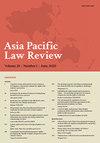New Asian regionalism in international economic law
IF 1.7
4区 社会学
Q2 LAW
引用次数: 6
Abstract
The economic dynamics of Asian countries have undergone a remarkable transformation over recent decades, culminating in unprecedented levels of growth and development. More recently, Asia has also become more connected and economically integrated through the formation of stronger trade and investment linkages. At a time when multilateralism is subject to stalemate or even backlash, Asian regionalism remains on an upwards trajectory. Asia’s rapid growth and integration make it an intriguing region to study, and it is globally important to focus on the legal regimes based on which the region’s trade and investment ties are proliferating. Some of the most pertinent questions are: Is Asian regionalism qualitatively different from previous waves of regionalism? What are the endogenous and exogenous influences that have shaped Asian regionalism? Will Asian countries take the lead in devising a new approach to economic integration for the Global South? How do we assess the significance of Asian regionalism and its impact on the multilateral trading system? In his detailed and ambitious book, Professor Pasha L. Hsieh, Associate Professor at the Singapore Management University, provides sharp observations and rich interdisciplinary analysis to answer the questions raised above. In doing so, Hsieh reveals his deft understanding of the region and its relationship with international economic law through the depth of his insightful ideas, thought-provoking arguments, and astute and pragmatic proposals. At the outset, Hsieh introduces Asian regionalism as a paradigm shift in international economic law, which he describes as representing a new form of regionalism that he calls ‘Third Regionalism’ and the ‘New Regional Economic Order’ (NREO). Here, through detailed research, Hsieh points to the increasing number of countries in the region using their rising economic weight to generate normative changes in new trade dynamics. Given the changing status of Asian countries and regionalism in the twenty-first century, Hsieh argues that a new framework to comprehend these dynamics and their nuances is needed if not overdue. Revisiting existing scholarship on regionalism and international relations theories, Hsieh establishes the NREO as a new normative framework better equipped to take fundamental economic and geopolitical changes into consideration. Having set out the book’s theoretical scope, Hsieh moves on to provide a vivid portrait of the legalization process of the Association of Southeast Asian Nations (ASEAN) framework. The transformation of ASEAN from an apolitically oriented regime to a legal one, imposing both soft-law and hard-law obligations, has rendered it an indispensable pillar of new Asian regionalism. Hsieh’s argument that pragmatic incrementalism as embodied in ASEAN could serve as an(admittedly imperfect) model for developing countries is persuasive, as is his reasoning for why ASEAN does not, cannot, and does not want to simply replicate what has been done in Europe. Hsieh then devotes attention to the Regional Comprehensive Economic Partnership (RCEP), which he argues is a milestone for Asian regionalism marking a departure from the Northdominated Washington Consensus. While there is a convergence of key legal and political国际经济法中的新亚洲区域主义
近几十年来,亚洲国家的经济动态发生了显著变化,达到了前所未有的增长和发展水平。近年来,亚洲通过建立更紧密的贸易和投资联系,联系更加紧密,经济一体化程度更高。在多边主义陷入僵局甚至遭到抵制的背景下,亚洲地区主义仍呈上升趋势。亚洲的快速增长和一体化使其成为一个值得研究的有趣地区。从全球来看,关注该地区贸易和投资关系赖以发展的法律制度具有重要意义。一些最相关的问题是:亚洲地区主义与之前的地区主义浪潮有质的不同吗?形成亚洲地区主义的内生和外生影响是什么?亚洲国家是否会带头为全球南方设计经济一体化的新方法?我们如何评价亚洲区域主义的重要性及其对多边贸易体制的影响?新加坡管理大学(Singapore Management University)副教授谢家华(Pasha L. Hsieh)教授在其详尽而雄心勃勃的著作中,提供了敏锐的观察和丰富的跨学科分析来回答上述问题。在此过程中,谢家华通过其深刻的见解、发人深省的论点和精明务实的建议,揭示了他对该地区及其与国际经济法关系的敏锐理解。首先,谢长华将亚洲地区主义作为国际经济法范式的转变进行了介绍,他将其描述为一种新的地区主义形式,他称之为“第三地区主义”和“新区域经济秩序”(NREO)。在这里,通过详细的研究,谢长廷指出,该地区越来越多的国家利用其日益增长的经济实力,在新的贸易动态中产生规范的变化。鉴于亚洲国家和地区主义在21世纪不断变化的地位,谢长廷认为,一个新的框架来理解这些动态和它们的细微差别是必要的,如果不是迟来的话。在回顾现有的区域主义和国际关系理论的基础上,谢德华建立了一个新的规范框架,以更好地考虑经济和地缘政治的根本变化。在阐述了本书的理论范围之后,谢家华继续生动地描绘了东南亚国家联盟(ASEAN)框架的合法化过程。东盟从一个非政治导向的政权转变为一个法律政权,同时施加软法和硬法义务,使其成为新亚洲地区主义不可或缺的支柱。谢家华认为,东盟所体现的实用主义渐进主义可以作为发展中国家的一个(诚然不完美的)模式,这一观点很有说服力,正如他对东盟不能、不能、也不想简单地复制欧洲所做的事情的理由一样。谢长廷接着关注了区域全面经济伙伴关系协定(RCEP),他认为这是亚洲地区主义的一个里程碑,标志着背离了北方主导的华盛顿共识。虽然关键的法律和政治
本文章由计算机程序翻译,如有差异,请以英文原文为准。
求助全文
约1分钟内获得全文
求助全文

 求助内容:
求助内容: 应助结果提醒方式:
应助结果提醒方式:


